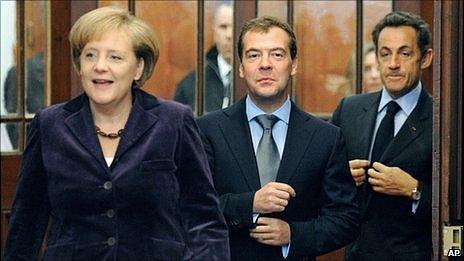Analysis: Deauville summit
- Published

The leaders met in the French resort of Deauville
The leaders of Russia, France and Germany - Dmitry Medvedev, Nicolas Sarkozy and Angela Merkel - have been holding a summit in the French resort Deauville aimed, according to Russia, at building a "common vision for Europe".
Here three academics - based in Berlin, Moscow and Paris respectively - give their views on the summit to the BBC's Russian Service.
Prof Klaus Segbers, Free University Berlin
"The meeting is a far cry from similar encounters some years ago, when [Jacques] Chirac, [Vladimir] Putin and [Gerhard] Schroeder fixed their coalition against the US military attack in Iraq.
"This does not mean that this meeting in France is meaningless. Topics include a new architecture of global financial flows, the security configuration in Europe from the Atlantic to the Pacific, and proliferation issues like that with Iran.
"There is one factor troubling all three leaders meeting in France: their domestic landscape. In Germany, Mrs Merkel faces deteriorating poll figures, a shaky coalition with liberal democrats and a surge of opposition forces in the polls.
"At the same time, there are issues that worry societies in all three countries. The major ones are [easing] visa regulations, the need to forge some sort of joint energy policy, dealing with the chaotic situation in Afghanistan, stabilising Pakistan, reaching agreement over European ballistic missile defence, and dealing with Iran's nuclear ambitions.
"Looking at the three-way from a German perspective, the German-Russian dimension is relatively free of clouds. Economic and social relations are prospering. German companies are eager to help with modernising Russia.
"More than six decades since the end of World War II, history does not play a decisive role anymore. In a way, it is ironic that the good German-Russian relations over the Putin-Schroeder years, much criticised then by Merkel, have been replaced by no less sound Merkel-Medvedev contacts."
Prof Irina Busygina, Moscow State Institution for Foreign Relations (Mgimo)
"The big hopes of the past have faded: officials talk of a serious 'chill' and it remains quite unclear just how relations between Russia and the EU can be revitalised.
"This situation seems paradoxical. On the one hand, we need each other - we are geographically close, we have strong trading links, centred around Russia's export of energy to the EU. On the other hand, these firm economic ties have not matured into comparable political relations.
"The Russian authorities capitalise on this autonomous development of two spheres - trade/economic and political - to present the EU as an unobjective critic of Russian political realities. A further paradox is that Russia's relations with the main European leaders, Mr Sarkozy, Mrs Merkel etc, are developing much better than relations with the EU as a whole. What explains this lack of 'unison'?
"From the Russian perspective, the EU lacks a mechanism for developing a single, viable foreign policy. Since the national leaders in the EU have widely varying priorities, Russia does not foresee the prospect of a common EU foreign policy.
"Russia does not have great expectations that the Deauville summit will usher in a new era in Russo-EU relations. But does this mean that these relations are condemned to long-term stagnation? Well, there is one source of hope: Western assistance to Russia.
"This will be one of the major factors in whether Russia's national modernisation programme succeeds or not. The problem is, the EU wants that help to be linked to the development in Russia of stable and transparent institutions. If the two sides fail to reconcile these differing approaches, it is difficult to see how a breakthrough in relations could be achieved."
Dominic Fean, Institut Francais des Relations Internationales (Ifri), Paris
"The Deauville summit represents the resurgence of a recurrent trend in European relations. These meetings stoke fears in smaller European states of a concord of Great Powers, in which important regional decisions will be taken without them.
"While initially critical of Russia under Putin, Nicolas Sarkozy has spearheaded attempts to bring Russia closer to the West and has privileged bilateral relations with his Russian counterpart.
"As images of the Chechen war have faded from news coverage, it has become easier for foreign powers to overlook Russia's human rights record. These issues remain a concern for French public opinion, however.
"France is keen to engage Russia in discussions on trade and security. The French leadership is convinced of the potential of the Russian market and is eager to secure a prominent position for French companies in the realisation of this potential.
"The French leadership is equally convinced that Russia is vital to European security: any arrangement with which Russia is dissatisfied will not endure, as illustrated by the Russia-Georgian war in 2008. France is interested in addressing Russia's problems with the current security arrangements, but does not intend to see them dismantled.
"France's strategic aims are to secure contracts for French firms and garner influence within the existing balance of power. French officials present the summit as a step toward Russia's rapprochement with the West."
- Published19 October 2010